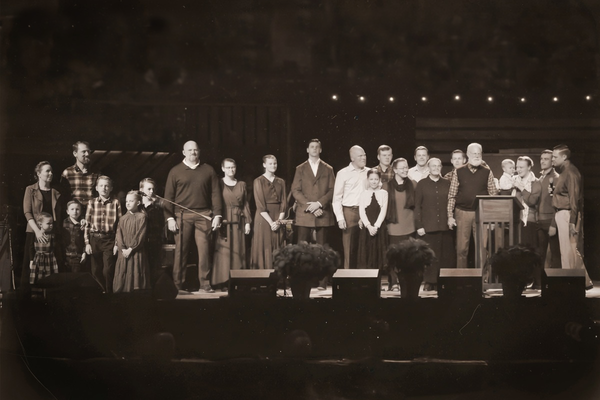The “Cult” Label
In today’s climate, few words carry as much emotional weight as “cult.” It’s a label often used to marginalize, dehumanize and isolate groups that deviate from mainstream norms. But what does it really mean? In this letter, we’ll explore the reasons behind the use of this term and the impact on thos
Unpacking the Power and Misuse of a Loaded Term
Dear Readers,
In today’s climate, few words carry as much emotional weight as “cult.” It’s a label often used to marginalize, dehumanize and isolate groups that deviate from mainstream norms. But what does it really mean? In this letter, we’ll explore the reasons behind the use of this term and the impact on those thus labeled.
Why the Cult Label Matters
At first glance, “cult” might seem straightforward—a term for fringe or dangerous groups. Yet, the reality is far more complex. The term is often used as a weapon to provoke fear and exclusion. But when pressed for a definition, many struggle to clearly articulate what makes a group a cult. And many of the various reasons people offer would apply to numerous other groups that conveniently evade the label. I want to introduce four possible reasons why someone might use the “cult” label.
1. True Cults: The Rare Reality
In some cases, the label is accurate. True cults suppress personal responsibility and demand total obedience to a supreme leader. They reject critical thinking (especially toward authority), grounding their authority in something novel, distinct from traditional scripture or ancient beliefs. Unable to foster positive, thriving multi-generational communities, they sow discord, abuse, and sometimes violence.
Infamous examples include the Branch Davidians, Jim Jones’s People’s Temple, and the Children of God. North Korea is a modern example—an entire nation functioning as a State-cult. These examples give the word “cult” its potency, evoking deep fear. When people use the term flippantly, they associate a group with these horrors, implying that any group labeled a “cult” could be the next Jim Jones or David Koresh horror.
But the term is most often misused to vilify and silence those who live differently. This misuse can have serious consequences—not just for individuals but for religious freedom itself.
A Real-World Example: France’s Cult Laws
France’s About-Picard Law of 2001 supposedly aimed to combat harmful cult activities. However, its vague language allowed authorities to target and discriminate against religious minorities, including Christian groups. This led to increased surveillance and stigmatization of peaceful communities.
Professor Eileen Barker, an expert on religion and cults, made the following observation about the French legislation, saying the “law is designed to protect its citizens from potential harm from groups exhibiting ‘dérives sectaires,’ also referred to by the pejorative term ‘cults’…and can be legally condemned before they have actually done anything illegal other than being labeled a ‘cult.’” The Organization for Security and Co-operation in Europe (OSCE) further cautioned against this measure, saying, “It is unbearable that a so-called liberal society preach tolerance and at the same time be itself intolerant, that is, be intolerant in the very name of tolerance.”
2. The Role of Bigotry
Another reason the “cult” label is used is bigotry. This doesn’t just apply to racial hatred—it extends to cultural and religious differences. Fear of the unfamiliar leads to quick judgments. Just as racism dehumanizes people based on skin color, religious bigotry dismisses entire communities as “other” and inferior.
Throughout history, communities that choose to live differently—whether through distinct religious practices, cultural customs, or education—have faced backlash. Fear manifests in the rapid application of the “cult” label, preventing understanding or dialogue.
Martin Luther King Jr. captured this well: “Men…fear each other because they don’t know each other, and they don’t know each other because they don’t communicate with each other.”
One of the most troubling aspects of this bigotry is how eagerly the media amplifies it. Fear, gossip and labels drive ratings far better than honest journalism. Historically, the media played a role in stoking racial bigotry. Today, the same playbook is used against minority faith groups.
The hypocrisy is staggering. These outlets preach cultural sensitivity when discussing burka-wearing Muslims and Sharia law, yet in the next breath, vilify conservative Christians living peaceful, agrarian lives as members of a “dangerous cult.” The double standard is glaring, and the insult profound.
3. Cognitive Dissonance Among Ex-Members
The third reason a group may be labeled a “cult” is connected to the phenomenon of ex-member cognitive dissonance. Sociologists have shown that high-demand religious groups1 are often unfairly branded as cults by former members. This can be deeply painful for those who remain. Hearing people who once loved you—people you still care about—twist reality and spread falsehoods is confusing and hurtful.
But why do they do it? What drives this distortion of the past, this reimagining of what was once cherished? Two psychological concepts help explain this: “reaction formation” and “cognitive dissonance.”
Reaction formation is a defense mechanism where a person unconsciously turns feelings they find unacceptable or painful into their opposite. For instance, if someone deeply loves and misses something but cannot cope with the pain of separation, they might transform that love into animosity or even slander to protect themselves from the emotional pain of loss.
Cognitive dissonance is related to this. When a person holds two conflicting beliefs—such as still loving something but being separated from it—they experience emotional discomfort. To ease this discomfort, they might redefine what they’ve lost as something evil to be feared. This is why slander from ex-members is not only possible but common. In her writings, Eileen Barker observes that members can face isolation, rejection, and pressure from family and friends who perceive their involvement as dangerous or misguided.2
4. Doctrinal Sectarianism: A Historical and Modern Issue
The fourth reason groups are labeled a “cult” is doctrinal sectarianism. Throughout history, this dynamic has fueled religious wars and persecution. When Christians feel threatened by another group’s lifestyle or beliefs but cannot refute them, they often resort to ad hominem attacks, labeling the group a “cult.” It has been wisely said, “When the debate is lost, slander becomes the tool of the loser.”
Interestingly, the term “cult” appears in the Bible. In Acts 24:14, Paul states, “But I admit that I follow the Way, which they call a cult. I worship the God of our ancestors, and I firmly believe the Jewish law and everything written in the prophets” (NLT). So, even early Christianity was labeled a cult by Jews, pagans, and the Roman state. Seen as an unlicensed religion, Christianity faced systematic persecution, much like minority religious groups today.
So, now that we've briefly considered the four main reasons why the “cult” label is used, let's consider the modern implications of this practice.
Modern Implications and the Danger of Labels
The misuse of the “cult” label is not just an academic issue; it has real-world consequences. Governments, like China’s, use it to justify the persecution of unregistered Christian communities while maintaining a facade of religious tolerance. In the U.S., small, traditional Christian groups that don’t align with modern values are often similarly marginalized.
The stakes are high. The “cult” label can lead to social stigma, discrimination, and even legal challenges, all of which cause real harm to individuals and communities. As believers, we must use words carefully, ensuring they are not weaponized to silence or destroy others. As Plato cogently observed: “False words are not only evil in themselves, but they infect the soul with evil.”
Final Thoughts
As we reflect on these insights, let’s remember the words of Jesus: “Do unto others as you would have them do unto you” (Luke 6:31) and “Love your neighbor as yourself” (Matt. 22:39). These values challenge us to treat others with the same respect and compassion we desire for ourselves, even when we encounter differences in belief or practice.
Unfortunately, we live in an era where responsible journalism is fading fast. Has the rat race for clicks and trending stories truly eclipsed all attempts at fairness and thoroughness? I want to believe there are still a few who honor their profession, but sadly, many lack the integrity to rise above their biases. Particularly when it comes to conservative—or “primitive”—Christianity, the media seems incapable of comprehending any narrative that doesn’t fit neatly into their preconceived boxes—“good” and “bad,” “modern” and “regressive.”
To them, we are nothing more than a label—a faceless entity unworthy of empathy. They don’t see the real lives behind the headlines—the bonds of love and faith that have held strong for decades. They don’t hear our children’s questions, like the seven-year-old who asks, “Daddy, why do people lie about us? Do they want to hurt us?” They don’t understand the depth of discrimination we’ve endured for over 50 years, nor the scars left by media manipulation and public hatred.
Have their teenagers been plastered against a barn wall as bullets rained down from drunken “heroes” perched above the Colorado canyon, stirred up by fear of the “dangerous cult” below? Ours have. Has their church property been defaced with swastikas? Ours has. Have they received weeks of death threats, vowing to fill the “cult’s” cemetery with their children? We have. No, they sit in their ivory towers, exploiting fear for growing profits, feeding an industry that only moves forward when stoked by flames of animosity and atrocity.
But we take solace in this: they’ve tried to crush us for 50 years and failed. And they will continue to fail because they can only exploit the ignorant—those unwilling to look for themselves, learn for themselves, think for themselves, and speak for themselves.
Our answer to this exploitation has been more transparency—opening our lives wider than ever. Our Sunday services, Wednesday home gatherings, craft village, our farm, annual festivals, concerts—our entire way of life is laid bare for anyone to see. Yes, our flaws are visible, but so is our humanity. People who once feared or misunderstood us have crossed those barriers and clasped hands in friendship, forming bonds stronger than the puppet strings our culture’s media masters try to pull.
For that, my heart overflows with gratitude for the many people—across this town, state and nation—who have opened their hearts to us. They’ve transcended the stereotypes and found genuine friendship and understanding. May God bless the honest!
Let’s strive to understand before we judge, and approach every situation with humility and a commitment to truth.
Podcast Update:
Please note that the corresponding podcast video for this topic will be released not this Wednesday but the following week. In the upcoming episode, we are honored to feature an interview with Dr. Gordon Melton, the world’s foremost authority on cults and religious movements outside the mainstream. Be sure to tune in for a deeper exploration of the ideas discussed here.
Thank you for being part of this important conversation. God bless you all.
Asahel





